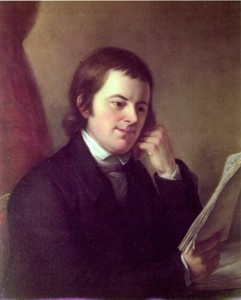 Supreme Court Justice Thomas Johnson was appointed to the Court by George Washington in 1791 to fill the seat left vacant when Justice John Rutledge resigned. He reluctantly accepted this appointment from Washington, who was a close friend and colleague.
Supreme Court Justice Thomas Johnson was appointed to the Court by George Washington in 1791 to fill the seat left vacant when Justice John Rutledge resigned. He reluctantly accepted this appointment from Washington, who was a close friend and colleague.
Johnson was born on November 4, 1732, in Calvert County, Maryland. Thomas and his brothers and sisters were educated at home. When he became interested in the study of law, he moved to Annapolis, the colonial capital of Maryland, and became employed as a court clerk. At the same time he studied law with Stephen Bordley, a member of a very politically influential family at the time. He was admitted to the Maryland Bar in 1753. He married Ann Jennings, daughter of an Annapolis judge, in 1766. the couple had eight children.
Johnson became a member of the Maryland Colonial Assembly, where he was an outspoken opponent of the Stamp Act. He also served as a member of the Continental Congress, during which time he nominated George Washington as Commander In Chief of the Continental Army.
He later served three terms as first Governor of Maryland, and as Chief Judge of the Maryland General Court.
In 1788 Johnson supported ratification of the U.S. Constitution at the Maryland Constitutional Convention.
When he was appointed to the Supreme Court in 1791, Johnson was 59 years old, and in poor health. Johnson was reluctant to serve because he was not feeling up to the rigors of “riding circuit,” which involved strenuous travel and poor accommodations. Washington wrote to Johnson before the appointment, to determine whether he would accept the appointment. Johnson replied without committing, asking “whether the southern circuit would fall to me; if it would at my time of life and otherwise circumstanced as I am it would be an insurmountable objection.” Chief Justice John Jay, assured him that he would do everything possible to relieve the rigors of circuit court duty, but Jay reneged on this promise. Johnson was appointed to the southern circuit, which was particularly large and difficult to cover. Johnson’s ambivalence to serve was the norm for Justices during the early years.
Johnson does have the distinction of having written the Supreme Court’s first written opinion, in Georgia v. Brailsford, in 1792. He resigned from the Court in January of 1793, when riding circuit became too much for him.
He was in poor health for the rest of his life. He did eulogize his good friend George Washington at a birthday memorial service in 1800. He died in 1819 at his home in Frederick, Maryland.




{ 1 trackback }